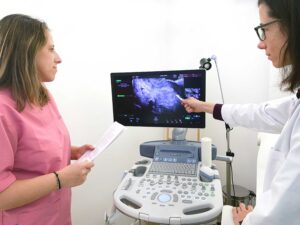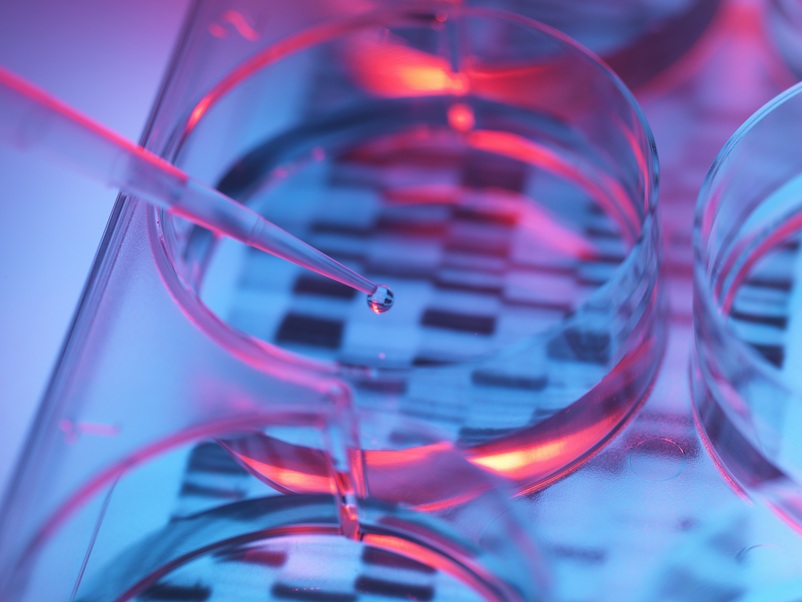Table of contents
Did you know that some fertility problems have a basis in genetics? This is why, among the tests that we at Tambre usually request for women and couples who come to a fertility clinic, there are some that help us determine whether there is a genetic basis for the infertility problem.
In the case of men, studies such as karyotyping, Y-chromosome microdeletion analysis or genetic screening for cystic fibrosis can reveal whether a low sperm count has a genetic origin. In women, meanwhile, karyotyping and fragile X chromosome syndrome testing can identify the causes of recurrent miscarriage or low ovarian reserve, respectively. These tests are essential for understanding the problem and moving towards personalised solutions. At Tambre, we use cutting-edge genetic analysis to turn this information into a decisive ally in achieving pregnancy in the shortest possible time.
The importance of genetics in fertility

Genetics plays a crucial role in the ability to conceive. Today we know that at least 2,000 genes are involved in the process of sperm formation and, although fewer genetic causes of infertility have been identified in women than in men, we must take into account certain diseases such as hereditary thrombophilias, which cause difficulties when having children.
Some genetic alterations can influence the quality of the eggs or sperm, affect embryo implantation or even be related to recurrent miscarriages.
In addition, genetics applied to fertility also helps us understand and even prevent the transmission of hereditary diseases. This is especially important in cases where there is a family history of genetic diseases or previous treatments have failed, as sometimes future parents are not aware that they are carriers of a genetic disorder until they begin experiencing difficulties in getting pregnant.
How does genetics affect fertility
Genetics is essential to understanding some of the problems that can affect fertility. Chromosomal abnormalities, genetic mutations and hereditary diseases are some of the most common causes of infertility or complications during pregnancy:
- Aneuploidy: These are numerical or structural abnormalities of the chromosomes, i.e., where there are one or more additional chromosomes or one or more chromosomes are missing. As each chromosome contains hundreds of genes, the gain or loss of a single chromosome alters the existing balance in the cells and, in most cases, is not compatible with life. These chromosomal abnormalities can interfere with conception or cause miscarriages.
- Hereditary diseases: These are genetic mutations that could be passed on to children and compromise their health.
The impact on gametes
Genetic abnormalities can also affect the quality of eggs or sperm, reducing the chances of fertilisation or embryo development:
A) Genetic male infertility. The most common cases of genetic sterility in males are:
- Klinefelter syndrome, which occurs when a male has an extra X chromosome. As a result, spermatogenesis is defective and no sperm is produced, which is the most important genetic cause of non-obstructive azoospermia.
- Microdeletions of the Y chromosome. This occurs when there are small losses of genetic material on the Y chromosome. Once again, the consequence is non-obstructive azoospermia in men.
- Mutations in the cystic fibrosis gene (CFTR). This type of defect causes the congenital bilateral absence of the vas deferens, which prevents sperm from leaving the urethra during ejaculation. This is the main genetic cause of obstructive azoospermia.
- Genetic alterations in the sperm. Even if the patient has no genetic alterations, it is also possible that the sperm does, due to failures in the process of formation and maturation in the testicles.
B) Genetic female infertility. In the case of women, the most common genetic conditions are:
- Turner syndrome, which is the most relevant chromosomal disease that causes sterility, due to the patient having only one sex chromosome.
- Hereditary thrombophilias. When there are defects in blood clotting, recurrent miscarriages can occur.
- Genetic abnormalities in the eggs. As with sperm, eggs can also carry numerical or structural chromosomal abnormalities caused in the process of formation (meiosis).
C) Genetic abnormalities in the embryo
Even if the eggs and sperm of the couple are healthy and do not present genetic alterations, it is possible that the resulting embryos do. An embryo with an abnormal number of chromosomes may fail to implant or may result in a miscarriage.
The main cause of genetic alterations in embryos is poor oocyte quality, as a result of the advanced age of the mother.
Types of genetic tests available at Tambre

Genetics is important in the study of fertility. This is why we have different diagnostic genetic tests at Tambre, to offer you a complete genetic analysis and personalised advice to understand the possible risks so you can make informed decisions.
These genetic tests can be very useful in fertility treatment as they provide us with information about reproductive health and the likelihood of success. However, not all genetic tests are necessary in every case, their usefulness must be determined depending on the individual situation of each patient:
- Preimplantation Genetic Diagnosis (PGD): This genetic test can detect chromosomal abnormalities in the embryo before transfer. This means we can determine which embryos are healthy, of better quality and more likely to result in implantation. This technique increases the success rate of IVF treatments and reduces the number of cycles needed.
- Genetic Compatibility Test (GCT): This evaluates the probability of a couple being carriers of genes that could cause a hereditary (recessive) disease in their offspring. This test helps minimise the chances of passing on genetic diseases to the future baby.
- Comet Fertility™ or Male Infertility Test (idiopathic): This test is used to analyse breaks or lesions in the DNA chains of the sperm that may be the cause of low fertilisation rates, slow embryonic development and an increased risk of miscarriage.
- FISH or Semen Quality Test: This allows us to evaluate the genetic integrity of the sperm and to determine the levels of sperm with abnormal chromosome endowment in a semen sample, and to assess whether they exceed the limits of normality.
- Non-invasive prenatal test: myPrenatal is a simple test with no risks for the mother or the foetus, which aims to accurately detect chromosomal abnormalities in the baby with a simple blood test of the mother during pregnancy. If assisted reproduction treatment with PGD (Pre-implantation Genetic Diagnosis) has been carried out, this non-invasive prenatal test is not necessary, as the genetically healthiest embryos have been studied and selected prior to transfer.
In which cases are genetic test recommended?
If you are wondering whether you should undergo a genetic test, your personal medical team will be able to advise you. They will determine whether genetic testing is necessary and which tests are most appropriate in your case.
However, there are specific situations in which genetic tests may be essential to reach an accurate diagnosis and, thus, to be able to prescribe the most appropriate treatment:
- Repeated implantation failures.
- Family history of hereditary diseases.
- Advanced maternal age.
- Recurrent miscarriages.
- Diagnosis of abnormal karyotype.
Why Tambre?
With advances in reproductive and genetic medicine, we can identify genetic factors that could be hindering pregnancy and provide personalised solutions for each couple. At Tambre we use the most advanced and effective genetic tests, which give us valuable and necessary information to offer an accurate diagnosis in less time. In this way we can prescribe the personalised and most effective treatment that will enable us not only to achieve pregnancy, but do so in the shortest possible time.
At Tambre, every step, every diagnostic test, every exam or analysis is aimed at maximising the chances of success, ensuring that the dream of starting a family is brought ever closer. Should you have any questions or require further information on the importance of genetics in assisted reproduction, please do not hesitate to contact us on +44 (0) 20 38 688 650.


